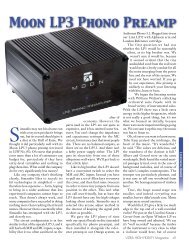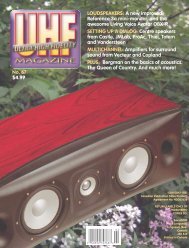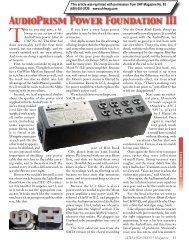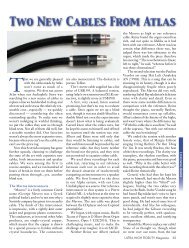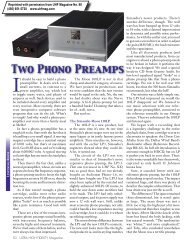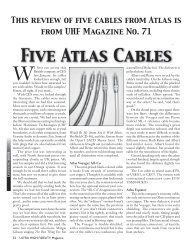LOUDSPEAKERS: Does the Totem Mani-2 still rate as one of the ...
LOUDSPEAKERS: Does the Totem Mani-2 still rate as one of the ...
LOUDSPEAKERS: Does the Totem Mani-2 still rate as one of the ...
You also want an ePaper? Increase the reach of your titles
YUMPU automatically turns print PDFs into web optimized ePapers that Google loves.
S<strong>of</strong>tware<br />
Feedback<br />
lowing <strong>the</strong>ir secret marriage. Elizabeth’s<br />
letters to her sister inspired composer<br />
Dominick Argento to write <strong>the</strong>se five<br />
songs for <strong>the</strong> wonderful mezzo-soprano<br />
Frederica von Stade: C<strong>as</strong>a Guidi, <strong>the</strong><br />
Italian Cook and <strong>the</strong> English Maid, Robert<br />
Browning, The Death <strong>of</strong> Mr. Barrett, and<br />
Domesticity.<br />
Fans <strong>of</strong> “Fricka” will find her again<br />
with joy. She h<strong>as</strong> lost n<strong>one</strong> <strong>of</strong> <strong>the</strong><br />
immense talent that propelled her to <strong>the</strong><br />
summit <strong>of</strong> her art, where she h<strong>as</strong> sh<strong>one</strong><br />
since her beginnings, playing all <strong>of</strong> <strong>the</strong><br />
roles most sought after in <strong>the</strong> opera<br />
world.<br />
That is followed by a Capriccio for<br />
Clarinet and Orchestra, subtitled Rossini<br />
in Paris, brilliantly performed by<br />
virtuoso clarinetist Burt Hara. It is in<br />
point <strong>of</strong> fact a concerto, a title Argento<br />
ULTRA HIGH FIDELITY Magazine<br />
h<strong>as</strong> eschewed by respect for “<strong>the</strong>” clarinet<br />
concerto, <strong>the</strong> <strong>one</strong> by Mozart. The<br />
movements have <strong>the</strong> curious titles <strong>of</strong><br />
Une réjouissance, Une caresse à ma femme<br />
and Un petit train du plaisir. Each refers<br />
to a composition by Rossini, but <strong>the</strong>y<br />
are mere pretexts for development <strong>of</strong><br />
a “Rossiniesque” ambience <strong>of</strong> comical<br />
verve, fant<strong>as</strong>y and humor, with a certain<br />
touch <strong>of</strong> romanticism.<br />
The final work, commissi<strong>one</strong>d by <strong>the</strong><br />
Minnesota Orchestra for its 75 th se<strong>as</strong>on<br />
(in 1977), is titled In Praise <strong>of</strong> Music: Seven<br />
Songs for Orchestra. Each song is inspired<br />
by a character, ei<strong>the</strong>r real or mythical,<br />
who awaken in universal f<strong>as</strong>hion feelings<br />
inherent in human nature.: David for <strong>the</strong><br />
healer, Apollo for <strong>the</strong> god, Pan for <strong>the</strong><br />
Satyr, Orpheus for <strong>the</strong> sorrower, Israel<br />
for <strong>the</strong> angel, Cecilia for <strong>the</strong> saint, and<br />
Mozart for <strong>the</strong> child.<br />
We should not be surprised by <strong>the</strong><br />
extraordinary performance by Eiji Oue<br />
and <strong>the</strong> Minnesota, whoch have accustomed<br />
us to excellence.<br />
The sonic quality <strong>of</strong> this HDCD<br />
recording, like those <strong>of</strong> <strong>the</strong> Reference<br />
Recording that follows, is beyond<br />
reproach. We can, I think, speak <strong>of</strong> <strong>the</strong><br />
Johnson sound.<br />
American Requiem<br />
Danielpour & Pacific Symph. Orch.<br />
RR-97CD RR-97CD<br />
Lessard: The dedication reads, “to <strong>the</strong><br />
memory <strong>of</strong> those who died in <strong>the</strong> wake<br />
<strong>of</strong> <strong>the</strong> tragic events <strong>of</strong> September 11,<br />
2001, and in tribute to <strong>the</strong> American<br />
Soldier — p<strong>as</strong>t, present and future.”<br />
To mark <strong>the</strong> end <strong>of</strong> his posting <strong>as</strong><br />
composer in residence with <strong>the</strong> orchestra<br />
in Orange County, California, Richard<br />
Danielpour received a commission for a<br />
major work for choir and large orchestra.<br />
The <strong>the</strong>me w<strong>as</strong> to be peace, but also<br />
man’s relationship with war.<br />
Danielpour admits that, before<br />
embarking on this project, he had not<br />
<strong>the</strong> slightest experience <strong>of</strong> war, and so he<br />
booked meetings with veterans <strong>of</strong> three<br />
wars. Listening to <strong>the</strong>m, writing down<br />
<strong>the</strong>ir experiences, thoughts and feelings<br />
long after <strong>the</strong> end <strong>of</strong> <strong>the</strong> conflicts<br />
in which <strong>the</strong>y had fought, enabled him<br />
to get at le<strong>as</strong>t a hint <strong>of</strong> <strong>the</strong> incurable<br />
traces left by <strong>the</strong> tragedy <strong>of</strong> war. So<br />
impressed w<strong>as</strong> he by <strong>the</strong> experience that<br />
<strong>the</strong> urgency grew in him to translate into<br />
music <strong>the</strong>se deep experiences.<br />
On <strong>the</strong> fateful morning <strong>of</strong> what<br />
would become known <strong>as</strong> 9/11, Danielpour<br />
w<strong>as</strong> preparing to edit <strong>the</strong> pro<strong>of</strong>s<br />
<strong>of</strong> <strong>the</strong> orchestral score <strong>of</strong> his American<br />
Requiem, but realized that it included<br />
nei<strong>the</strong>r preface nor dedication. He w<strong>as</strong><br />
on <strong>the</strong> ph<strong>one</strong> to his publisher in New<br />
York, when she told him with horror<br />
that before her eyes a plane had just<br />
struck a tower <strong>of</strong> <strong>the</strong> World Trade<br />
Center. He knew instantly that he had<br />
his dedication.<br />
One is generally eager to find antecedents<br />
in <strong>the</strong> works <strong>of</strong> a composer:<br />
in this p<strong>as</strong>sage he is clearly influenced by<br />
Bach, or <strong>one</strong> can recognize <strong>the</strong> style <strong>of</strong><br />
Mozart. It is possible, indeed certain,<br />
that because <strong>of</strong> Danielpour’s use <strong>of</strong> two<br />
languages — English and Latin — purists<br />
will think first <strong>of</strong> Brahms’ German<br />
Requiem or Britten’s War Requiem. One<br />
might equally be tempted to make<br />
comparisons with <strong>the</strong> Requiem <strong>of</strong> Verdi,<br />
recalling his use <strong>of</strong> a multitude <strong>of</strong> instruments<br />
and <strong>the</strong> importance given to <strong>the</strong><br />
human voice. Too e<strong>as</strong>y. It would be even<br />
more facile to talk <strong>of</strong> plagiarism.<br />
For my part I believe that, notwithstanding<br />
any similarities, delibe<strong>rate</strong> or<br />
o<strong>the</strong>rwise, this religious opus is both<br />
magnificent and eloquent. I consider it<br />
a gift to have been <strong>as</strong>ked to review it.<br />
Danielpour h<strong>as</strong> written this for a





